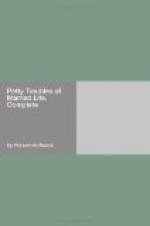“I will show you why. Let me take, for your wife’s sake, the shortest path—the parable.
“I remember having made a journey from Paris to Ville-Parisis, in that vehicle called a ’bus: distance, twenty miles: ’bus, lumbering: horse, lame. Nothing amuses me more than to draw from people, by the aid of that gimlet called the interrogation, and to obtain, by means of an attentive air, the sum of information, anecdotes and learning that everybody is anxious to part with: and all men have such a sum, the peasant as well as the banker, the corporal as well as the marshal of France.
“I have often noticed how ready these casks, overflowing with wit, are to open their sluices while being transported by diligence or ’bus, or by any vehicle drawn by horses, for nobody talks in a railway car.
“At the rate of our exit from Paris, the journey would take full seven hours: so I got an old corporal to talk, for my diversion. He could neither read nor write: he was entirely illiterate. Yet the journey seemed short. The corporal had been through all the campaigns, he told me of things perfectly unheard of, that historians never trouble themselves about.
“Ah! Hector, how superior is practice to theory! Among other things, and in reply to a question relative to the infantry, whose courage is much more tried by marching than by fighting, he said this, which I give you free from circumlocution:
“’Sir, when Parisians were brought to our 45th, which Napoleon called The Terrible (I am speaking of the early days of the Empire, when the infantry had legs of steel, and when they needed them), I had a way of telling beforehand which of them would remain in the 45th. They marched without hurrying, they did their little six leagues a day, neither more nor less, and they pitched camp in condition to begin again on the morrow. The plucky fellows who did ten leagues and wanted to run to the victory, stopped half way at the hospital.’
“The worthy corporal was talking of marriage while he thought he was talking of war, and you have stopped half way, Hector, at the hospital.
“Remember the sympathetic condolence of Madame de Sevigne counting out three hundred thousand francs to Monsieur de Grignan, to induce him to marry one of the prettiest girls in France! ‘Why,’ said she to herself, ’he will have to marry her every day, as long as she lives! Decidedly, I don’t think three hundred francs too much.’ Is it not enough to make the bravest tremble?
“My dear fellow, conjugal happiness is founded, like that of nations, upon ignorance. It is a felicity full of negative conditions.
“If I am happy with my little Caroline, it is due to the strictest observance of that salutary principle so strongly insisted upon in the Physiology of Marriage. I have resolved to lead my wife through paths beaten in the snow, until the happy day when infidelity will be difficult.




